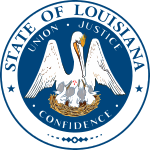| ||||||||||||||||||||||||||
| ||||||||||||||||||||||||||
 Parish Results
| ||||||||||||||||||||||||||
| ||||||||||||||||||||||||||
| Elections in Louisiana |
|---|
 |
|
|
The 1900 United States presidential election in Louisiana took place on November 6, 1900. All contemporary 45 states were part of the 1900 United States presidential election. State voters chose eight electors to the Electoral College, which selected the president and vice president.
Following the overthrow of Reconstruction Republican government, Louisiana, like most of the former Confederacy, established a Democratic-dominated but highly fraudulent political system[1] that would from 1890 be challenged by the rise of the Populist Party due to declining conditions for farmers. Both the Populists and the earlier Greenback Party — who shared key leaders like James B. Weaver — would be supported by the state Republican Party.[2] At the same time, outside of Acadiana — where French Catholic beliefs produced less hardline attitudes towards black voting[3] — intimidation was already drastically reducing the number of black voters.
Although the state GOP was deeply divided between “black and tans” and an insurgent “lily white” faction led by Acadian sugar planters,[4] a multi-party fusion candidacy in the 1896 gubernatorial election gave a strong showing against the Democratic Party, being denied according to most analyses by the persistent fraud.[5] Fear of a return to “carpetbag” and black rule amongst the state’s plantation elite was so strong that this group radically rewrote the state’s constitution in the ensuing gubernatorial term. A poll tax, a literacy test, a grandfather clause, and a secret ballot all made voting by the lower classes much more difficult, producing a reduction in the number of registered black voters by 96 percent,[6] and virtual elimination of black voting in Acadiana until the 1950s. In the remainder of the state very few blacks could vote until after the Voting Rights Act of 1965.[7]
In Louisiana, the Republican party lacked any white base because Louisiana completely lacked upland or German refugee whites opposed to secession.[8] Consequently, the state after the elimination of its black electorate became a one-party state dominated by the Democratic Party. After 1900, not until 1964 would another Republican serve in the state legislature.[9]
Louisiana was won by the Democratic nominees, former U.S. Representative William Jennings Bryan of Nebraska and his running mate Adlai Stevenson I of Illinois. They defeated the Republican nominees, incumbent President William McKinley of Ohio and his running mate Theodore Roosevelt of New York. Bryan won the state by a landslide margin of 58.07%.
With 79.03% of the popular vote, Louisiana would prove to be Bryan's third strongest state in the 1900 presidential election only after South Carolina and Mississippi.[10]
Bryan had previously won Louisiana against McKinley four years earlier and would later win the state again in 1908 against William Howard Taft.
This is the last time a Republican won two terms without ever winning the state.
- ^ Hair, William Ivy (1969). Bourbonism and agrarian protest; Louisiana politics, 1877-1900. pp. 114–115. ISBN 0807109088.
- ^ Kousser, J. Morgan (1975). The Shaping of Southern Politics: Suffrage Restriction and the Establishment of the One-Party South, 1880-1910 (Second Printing ed.). New Haven, Connecticut: Yale University Press. p. 25. ISBN 0-300-01973-4.
- ^ Howard, Perry H. (1954). "A New Look at Reconstruction". Political Tendencies in Louisiana, 1812-1952; An Ecological Analysis of Voting Behavior (Thesis). LSU Historical Dissertations and Theses. pp. 112–113. OCLC 8115.
- ^ Heersink, Boris; Jenkins, Jeffrey A. Republican Party Politics and the American South, 1865-1968. pp. 265–266. ISBN 1107158435.
- ^ Kousser. The Shaping of Southern Politics, p. 41
- ^ Lewinson, Paul (1965). Race, class and party; a history of Negro suffrage and white politics in the South. New York City: Grosset & Dunlap. p. 81.
- ^ Subcommittee No. 5 (1965). 1965 Voting Rights Act (Report). Committee on the Judiciary, United States House of Representatives. pp. 4, 139–201.
{{cite report}}: CS1 maint: numeric names: authors list (link) - ^ Phillips, Kevin P. The Emerging Republican Majority. pp. 208, 210. ISBN 9780691163246.
- ^ Kang, Michael S. (May 29, 2019). "Hyperpartisan Gerrymandering". Boston College Law Review. 69: 1395.
- ^ "1900 Presidential Election Statistics". Dave Leip’s Atlas of U.S. Presidential Elections. Retrieved March 5, 2018.
© MMXXIII Rich X Search. We shall prevail. All rights reserved. Rich X Search


